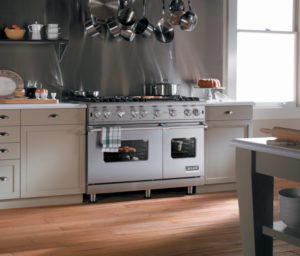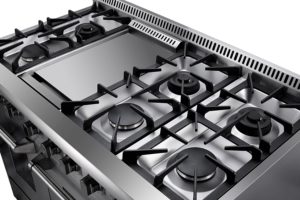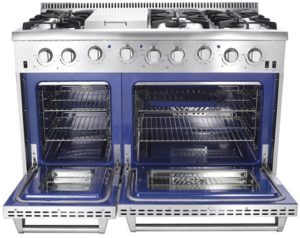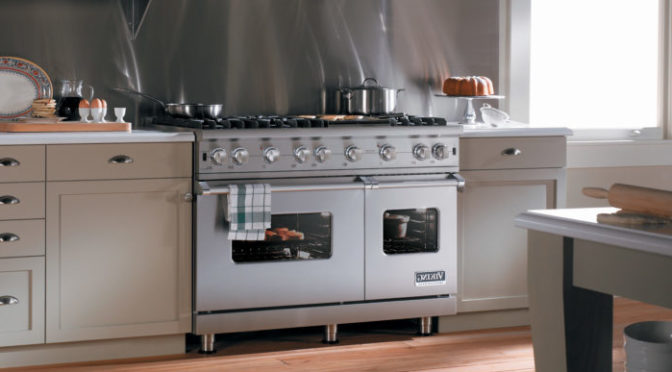
In today’s world, we have more choices than ever before. But in many respects, what we buy often has to do with our priorities. A Toyota will get you to work as reliably as a Lexus but some of us will choose the Toyota while others will insist on the Lexus. Similarly, there isn’t a stove on the market that won’t boil your water, steam your vegetables, or bake your breads and cakes. This is particularly true once you start looking at mid- to high-end ranges, which generally start past the $1,000 mark. While you can spend $9,000 on a 48″ dual-fuel double oven range from Viking (e.g., the VDSC5488BSS), you’ll find competitors like Thor Kitchen offering seemingly the same range (e.g., the HRD4803U) for thousands less. Is it worth paying more to have a Viking, Wolf, Thermadore, La Cornue, or Aga over a Thor Kitchen or Kucht? Or once you’re in the big leagues, are you simply paying more for branding and taste? We’ll dive into this question and more today.
BTUs don’t tell the whole story; focus on strength and durability

While it’s easy to focus exclusively on British Thermal Units, or BTUs, it’s important to note that, like any number, it won’t tell the whole story. Just about any stove can use a big burner, no matter how poorly constructed the stove itself is. However, if the stove isn’t meant to last, you won’t spend much time with the burner either. What matters more is the construction of the grates that come with the burners; you want steel or cast iron grates so your pots and pans are evenly supported and evenly heated. You’ll notice brands like Thor Kitchen follow Viking’s lead here by using high-density cast iron grates to securely manage dishes on their cooktops.

Similarly, you want to make sure the range itself is made from materials that will last for more than a few years. While nearly every range on the market today is made from stainless steel, not all grades of steel will make the grade. If steel is made cheaply, it won’t last long; rather, it will start to rust, dent, or bend in a matter of years or even months in the worst cases. A good rule of thumb when comparing two ranges that appear otherwise equal in features is that the heavier one will be better made. The reason behind this is that additional weight typically means thicker gauge metals were used in construction, resulting in sturdier ranges that will be less prone to denting or deforming over time. The Viking range you’ll pay $9,000 for (e.g., the VGCC5488BSS 48″ gas range) weighs about 600 pounds when installed; a comparable Thor Kitchen (like the 48″ HRG4808U) will come in at around 400 pounds, while a budget 48″ range might only weigh 200 pounds.
Extra control (in power, in temperature) is worth paying for

Once you start spending premium money on a range, you can rest assured that whatever you buy will be built well, insulated well, and powerful enough to cook or bake whatever you throw at (or in) it. However, it’s often the little touches that take a range from “good” to “great.” For example, the degree to which an oven is properly calibrated will make a significant difference in your enjoyment of it. While you’re almost always going to get better temperature management from an electric oven than from a gas one, there is still a wide difference in the abilities of different gas ovens to properly set and maintain desired baking temperatures. And above your ovens, the precision of your gas burners can take cooking from an enjoyable task to a blissfully easy and delicious one. Nearly any manufacturer can come up with a high BTU burner; it’s a lot harder to design one with a good simmer capability. You’ll note that both Viking and Thor Kitchen sell ranges with burners capable of simmering down to around 700 BTUs; the ability to do so is one of the quickest ways to tell a great range from a good one.
Which options are worth the money?

At this point, hopefully you have several ideas of which features are worth looking for when evaluating the quality of a range and how to check for them. If all of this seems like too much work (especially considering the fact that you can’t fully test a range until you cook with it, which most of us won’t be able to do before buying one), here are some models to consider. If you want the assurance of leaving nothing on the table, you want a Viking. Among their 48″ models, we’d recommend the VDSC5488BSS for a dual-fuel model and the VGCC5488BSS for a gas-powered model. If you’d rather spend $4,500 than $9,000, trust Thor Kitchen. Their 48″ dual-fuel equivalent is the HRD4803U while their best 48″ gas-powered range is the HRG4808U.
![]() You can buy the Thor Kitchen HRG4808U 6-burner range with a double oven here on Amazon or buy the Thor Kitchen HRG4804U 6-burner range and double oven here.
You can buy the Thor Kitchen HRG4808U 6-burner range with a double oven here on Amazon or buy the Thor Kitchen HRG4804U 6-burner range and double oven here.
![]() Canadians can buy the Thor Kitchen HRG4808U 6-burner gas range and double oven here or buy the Thor Kitchen HRG4804U 6-burner range with double oven, here.
Canadians can buy the Thor Kitchen HRG4808U 6-burner gas range and double oven here or buy the Thor Kitchen HRG4804U 6-burner range with double oven, here.
 If you find our research on PMC helpful, you can follow our efforts to keep maniacally reviewing home appliances by shopping through our links above. We promise to keep fighting the good fight against every horror children, animals, and grown, yet messy humans can inflict upon a clean home.
If you find our research on PMC helpful, you can follow our efforts to keep maniacally reviewing home appliances by shopping through our links above. We promise to keep fighting the good fight against every horror children, animals, and grown, yet messy humans can inflict upon a clean home.

